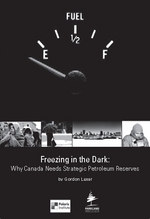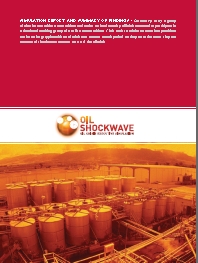

When oil crisis hits, fantasyland will become nightmare
 Freezing in the Dark: Why Canada Needs Strategic Petroleum Reserves
Freezing in the Dark: Why Canada Needs Strategic Petroleum ReservesGordon Laxer Parkland Institute & Polaris Institute January 31, 2008 Download report |
 Oil Shockwave
Oil ShockwaveNational Commission on Energy Security June 23, 2005 Download report |
Frances Russell
Winnipeg Free Press
Wed Feb 6 2008
IN 1980, furious Albertans slapped bumper stickers on their cars stating "Let the eastern bastards freeze in the dark" to protest Ottawa's "Canada First" National Energy Program. Every federal government since has ceded national energy policy to the provinces and, by proxy, to the North American marketplace.
This appalling abdication of leadership leaves Canada completely exposed to the supply crisis experts predict is inevitable once the world enters the dark and uncertain time of Peak Oil.
Here are some of the reasons why:
Canada exports 67 per cent of its oil to the U.S. yet 40 per cent of Canadians are totally reliant on offshore, mostly Middle Eastern, oil. The three leading Middle Eastern countries upon whom 36 per cent of Ontarians and 90 per cent of Quebecers and Atlantic Canadians depend are Algeria, Iraq and Saudi Arabia.
Before the North American Free Trade Agreement, 30 per cent of Canada's oil was exported to the U.S. NAFTA has more than doubled Canada's oil exports south.
The five proposed new pipelines from Alberta's tar sands to the U.S. will commit 75 to 80 per cent of Canada's oil to the American market. Yet it is the taxpayers of Alberta and Canada who will pay the staggering environmental costs and subsidize the extraction bills.
NAFTA's proportionality clause prohibits Canada's government from reducing energy exports even in times of crisis unless Canada cuts its consumption by the same amount.
No new east-west oil pipeline has been built in Canada since the Trudeau era. Until 1999, there was a steady flow of 250,000 barrels of western oil east to Montreal through the Montreal-Sarnia pipeline. Since 1999, that same pipeline brings 250,000 barrels of offshore oil west to Sarnia. Industry, not government, reversed the flow, no questions asked by government.
If a crisis hits, there is not enough east-west pipeline capacity to transport western oil to eastern Canadians.
Not only are there no new east-west pipelines on the drawing board, none is even being contemplated. No statistics are kept so no one knows where Newfoundland's daily 370,000 barrels of oil go.
Canada is the only oil-producing country -- and the only western industrialized country -- not to have a Strategic Petroleum Reserve (SPR). The International Energy Agency (IEA) requires net import nations to maintain emergency 90-day oil reserves. Net export nations are not obliged to keep SPRs because the IEA sensibly assumes no country exports without ensuring domestic needs first. The IEA has no mechanism for a nation that doesn't control its own resources.
Peak Oil is coming fast. The U.S. Department of Energy predicts it no later than 2010. The drop-off will be steep and rapid, throwing the world into crisis upon any war, terror attack or natural disaster. "Government intervention will be required, otherwise economic and social implications would be too chaotic," says the USDE.
Oil Shockwave, a 2005 U.S. National Commission on Energy Policy report, warns that a fairly minor disruption to world oil supplies would create a 177 per cent price spike. If the U.S. bombs Iran and the Strait of Hormuz is closed, global supply could be cut by one-fifth, or 17 million barrels a day.
As oil supply tightens, nations are moving away from free markets. About 80 per cent of global oil reserves are controlled by state-owned oil companies. Most have a nationalist orientation; domestic needs come first.
Canada's energy policy -- or lack thereof -- is unique across the globe. Again, it has no SPR, although nearly half its citizens are totally dependent on foreign oil. It ranks its own domestic needs and security inferior to those of its neighbour. Central and Atlantic Canadians are left without energy security and dependent on Middle East oil so that the U.S. can have greater energy security and less dependence on Middle East oil.
These sobering realities -- and more -- are laid out in a new report by the University of Alberta's Parkland Institute and Ottawa's Polaris Institute. Entitled Freezing In The Dark: Why Canada Needs Strategic Petroleum Reserves, its author is University of Alberta political economist Gordon Laxer, Parkland's founding director.
Laxer finds the curtain of silence around Canada's lack of energy security "unbelievable. We are as dependent on Middle East oil as the Americans. Every other country is talking about its security of supply -- India, China, the U.S. They are locking up long-term contracts with oil-producing countries. But here, nothing. We are so focused on our exports that nobody in Ottawa seems to think about security of supply for Canadians."
Laxer is shocked at the disinterest he encountered at the National Energy Board and Natural Resources Canada. "There's resource nationalism rising around the world, but the NEB and NRC just say they can't see a problem: 'We have all this oil and we can go to spot markets.' They're off in fantasyland."
When the oil crisis hits, Canadians will find the fantasyland a nightmare. They shouldn't forget who to blame.